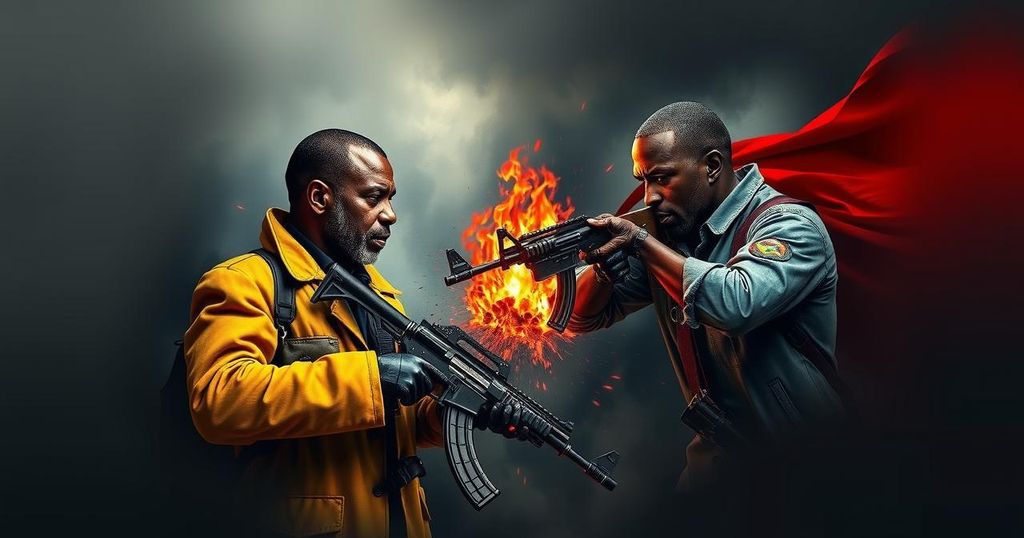Angola Voices Concern as Fighting Resumes in Eastern DRC

Renewed fighting in eastern Democratic Republic of Congo has prompted concerns from Angola, which seeks a long-term ceasefire. Clashes between M23 rebels and Congolese forces occurred in Kalembe, violating the ceasefire established in August. Angola has been mediating peace talks and condemned the violence, urging adherence to previous agreements. The humanitarian situation remains dire, with a significant number of civilians displaced due to ongoing conflict.
Renewed hostilities have erupted in eastern Democratic Republic of Congo (DRC), prompting the Angolan government to express deep concern as it aimed for a more enduring ceasefire. The violence reignited in Kalembe town, located within the Walikale territory of North Kivu Province, where M23 rebels engaged Congolese forces (Fardc) on Monday, just a day after the M23 had briefly taken control of the town before being repelled by the Congolese military. In a press statement issued on Tuesday, the Angolan government described the resurgence of violence as a blatant violation of the recommendations from the ministerial meeting held on July 30 and the subsequent ceasefire agreement that commenced at midnight on August 4. Angola has taken on a mediating role between the DRC and Rwanda, both of whom have accused each other of aiding rebel factions intent on destabilizing their regimes. Their most recent mediation efforts were undertaken two weeks ago in Luanda, where both parties committed to pursuing a peaceful resolution. The DRC has assured that it would prevent support from Fardc to the FDLR rebels, whom Rwanda considers enemies, contingent upon Rwanda ceasing its support for the M23 rebels. In its statement, Angola condemned the recent violence as an obstruction to ongoing efforts aimed at achieving a sustainable resolution to the conflict and reiterated calls for adherence to the ceasefire, as reaffirmed during the ministerial meeting on September 14. Recent reports indicate that on Sunday and Monday, violent confrontations occurred around Kalembe, involving the Wazalendo self-defense group, allied with the Congolese army, and the M23. Local sources confirmed that the Congolese army successfully regained control of the town. Juvenal Munubo, a former member of parliament from Walikale, stated, “I have learnt that the NDC Rénové (Kivu armed group), with logistical support from the Fardc, has regained control of the town of Kalembe. I call on the Fardc and the patriotic resistance fighters to consolidate this victory.” Lawmakers such as Willy Mishiki have raised alarms over the potential ambitions of M23 to extend their control over additional provinces including South Kivu, Tshopo, and Maniema in the eastern and northeastern regions of the DRC. Munubo further expressed concern regarding the lack of comments from Kinshasa officials on the truce’s collapse, questioning the status of the ceasefire agreed upon in Luanda. Despite the return to violence, a ceasefire that has been effective since early August saw some displaced persons begin to return to their homes, as they perceived them to be safer than overcrowded temporary shelters. On the political front, the DRC has dismissed any possibility of dialogue with the M23, although negotiations between the DRC and Rwanda are currently ongoing. During a meeting on October 12 involving the foreign ministers of Rwanda and the DRC, both nations agreed to proceed with discussions on unresolved security issues related to a draft peace agreement proposed by a facilitator. Angola urged all parties to refrain from actions that could exacerbate the conflict, worsening the dire humanitarian conditions in eastern DRC, and reaffirmed its dedication to finding a permanent solution through the Luanda Process, which is backed by the African Union. Moreover, Kigali and Kinshasa have reached an agreement to establish an ad hoc verification mechanism to oversee peace initiatives. This mechanism is anticipated to be officially activated in Goma, DRC, no later than November 5, 2024, according to the outcomes of the October 12 meeting. The latest clashes have left at least 14 civilians injured, with many fleeing their residences. The United Nations High Commissioner for Human Rights has projected that approximately 940,000 individuals will be displaced in 2024 alone, contributing to an estimated total of nearly seven million displaced persons within the DRC. This humanitarian crisis poses significant risks for civilians in North Kivu, who face severe overcrowding and alarming human rights violations, including sexual violence.
The Democratic Republic of Congo has been plagued by intermittent violence, particularly in the eastern regions where numerous armed groups operate, including the M23 rebel group. Over the years, conflicts have often spilled over into neighboring countries, particularly Rwanda, leading to heightened tensions. Recently, Angola has attempted to mediate peace talks between DRC and Rwanda amidst ongoing accusations of support for rebel forces. The ceasefire agreement established in early August was seen as a pivotal moment for stabilizing the region, allowing for some displaced individuals to start returning home. However, the recent resurgence of conflict illustrates the fragile nature of this peace and the urgent need for sustained diplomatic efforts.
In summary, the recent clashes in eastern DRC have raised alarms within the Angolan government, which is actively working towards a peaceful resolution amidst ongoing hostilities. The situation remains volatile, with both the DRC and Rwanda engaged in a diplomatic tug-of-war over rebel support, amidst the continued suffering of millions of displaced civilians. The commitment of all parties to uphold the ceasefire and engage in constructive dialogue will be essential in preventing further escalation and addressing the humanitarian crisis at hand.
Original Source: www.ghanaweb.com








